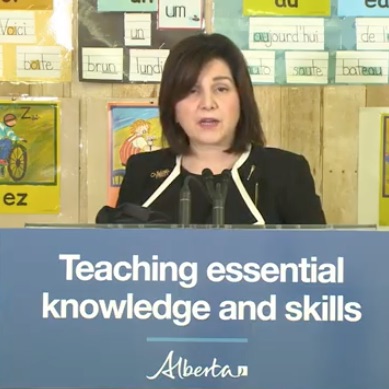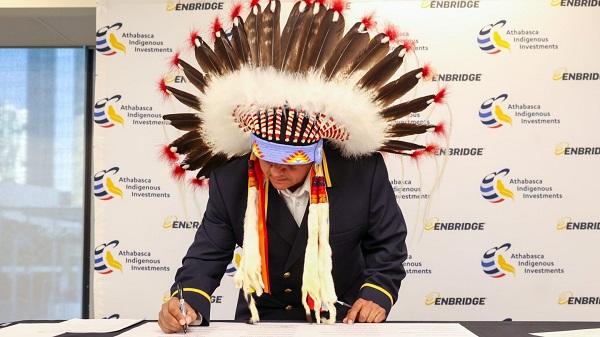Alberta
Literacy, numeracy, citizenship and practical skills featured in new Alberta K-6 curriculum

The following is a news release from the Province of Alberta
New K-6 curriculum: Renewing focus on essential knowledge and skills
Alberta’s updated draft kindergarten to Grade 6 curriculum brings a renewed focus to literacy, numeracy, citizenship and practical skills, giving students a strong base of essential knowledge for future learning.
The revised and strengthened K-6 curriculum – the result of more than a year of consultations with parents, teachers, and subject matter experts – is based on proven research and is designed to improve student outcomes across all subjects, following several years of declining and stagnant student performance.
“The new curriculum delivers on our commitment to Albertans to refocus learning on essential knowledge and skills in order to give our children the best possible chance at success. Parents and teachers have waited a long time for this, and I’m pleased to say that we’ve delivered. Another promise made, promise kept.”
Parents and teachers will see four key learning themes in the revised curriculum that spans all grades:
- Literacy
- Using phonics and other proven best practices, students will be taught to master reading, writing, speaking, and listening in order to build a strong foundation for learning.
- Numeracy
- By learning to think fluently about numbers and equations, students will gain essential knowledge for everyday tasks and a foundation for more complex learning in the future.
- Citizenship
- Drawing from history, geography, economics, civics, and other studies, students will develop an appreciation of how Canadians have built one of the most generous, prosperous, and diverse societies in the world.
- Practical skills
- From household budgeting, to digital literacy, business planning, healthy relationships and the importance of consent, students will learn a new set of essential skills that will prepare them for success in the real world.
“The new K-6 curriculum is inspired by the science of reading and brings to our teachers, parents, and children what is currently known around the world as best practice to support our children to become successful readers and writers.”
“This new draft curriculum is clear, concise, concrete and comprehensive. I am excited for both the teachers and their students, as it is a huge step forward towards evidence-based best practices in math education. This increased standard of excellence will give many parents great confidence that all our children will develop the mastery of fundamental knowledge, understanding, and skills in mathematics necessary to succeed in life.”
“The Edmonton Chamber applauds the new focus this curriculum places on financial literacy and the foundational skills that employers and entrepreneurs rely on each and every day. This will help spur creative thinking and fuel a new generation of Alberta entrepreneurial leadership.”
“As a former member on the Truth and Reconciliation Commission of Canada – Alberta, during our hearings was the first province to ‘publicly declare that it was launching its own initiative to develop mandatory curriculum on the Treaties and residential schools for all students’. We believed that education, in general, is the key to reconciliation and with the work done to date; it is consistent with the United Nations Declaration in the promotion of respectful relationships between citizens and as a Chief, I am honoured to be a validator to the new education curriculum and look forward to its transforming and positive change.”
“Including computer science in Alberta’s new K-6 science curriculum is a watershed moment; it means Alberta students will now learn the foundational ideas, problem-solving and creative thinking skills behind this 21st century science which now touches nearly every aspect of our lives.”
“I am thrilled that the Alberta government has ensured that consent will be taught as an essential part of the K-6 curriculum. I have been advocating for these changes for many years and applaud this leadership. We clearly know that this topic thrives on society’s ignorance and indifference so the sooner we give our young people the tools and confidence, the better. To prevent maltreatment we need to start at the youngest age possible, so, in my mind, this education will not only change lives, it will save them.”
Alberta’s government remains committed to a transparent review process. The draft K-6 curriculum is now online at alberta.ca/curriculum for all Albertans to provide feedback until spring 2022.
Next steps
Classroom validation, a process where school authorities are invited to test the draft curriculum, is targeted to begin in September with schools across the province that choose to participate.
Six million dollars have been set aside this fiscal year to support the new K-6 curriculum in select schools supporting validation. These funds will be used to develop critical resources and professional development to support teachers through this important validation phase.
Additional funds will be made available to support further implementation efforts in future budgets.
The feedback from Albertans and the classroom validation will be incorporated into the draft K – 6 curriculum before it is implemented across the province.
Students are expected to be learning from the new curriculum during the 2022-23 school year.
Quick facts
- Alberta’s Grade 4 student results for reading literacy in the Progress in the International Reading Literacy Study has declined over 10 years:
- 2006 score: 560 – ranked 1st of 45 countries
- 2016 score: 547 – ranked 17th of 50 countries
- Alberta’s Grade 4 student results in math and science in Trends in International Mathematics and Science studies declined between 2007 and 2019:
- 2007 math score: 505 – ranked 16th of 65 countries
- 2019 math score: 490 – ranked 39th of 64 countries
- 2007 science score: 543 – ranked 4th of 65 countries
- 2019 science score: 530 – ranked 16th of 64 countries
- In September 2022, the draft Grades 7 – 10 curriculum is expected to be ready for classroom validation.
- During the 2023-24 school year, the draft Grades 7 – 10 curriculum is targeted for province wide implementation.
- In September 2023, the Grades 11 and 12 draft curriculum is targeted for classroom validation, with provincial implementation the next year.
Alberta
Made in Alberta! Province makes it easier to support local products with Buy Local program

Show your Alberta side. Buy Local. |
When the going gets tough, Albertans stick together. That’s why Alberta’s government is launching a new campaign to benefit hard-working Albertans.
Global uncertainty is threatening the livelihoods of hard-working Alberta farmers, ranchers, processors and their families. The ‘Buy Local’ campaign, recently launched by Alberta’s government, encourages consumers to eat, drink and buy local to show our unified support for the province’s agriculture and food industry.
The government’s ‘Buy Local’ campaign encourages consumers to buy products from Alberta’s hard-working farmers, ranchers and food processors that produce safe, nutritious food for Albertans, Canadians and the world.
“It’s time to let these hard-working Albertans know we have their back. Now, more than ever, we need to shop local and buy made-in-Alberta products. The next time you are grocery shopping or go out for dinner or a drink with your friends or family, support local to demonstrate your Alberta pride. We are pleased tariffs don’t impact the ag industry right now and will keep advocating for our ag industry.”
Alberta’s government supports consumer choice. We are providing tools to help folks easily identify Alberta- and Canadian-made foods and products. Choosing local products keeps Albertans’ hard-earned dollars in our province. Whether it is farm-fresh vegetables, potatoes, honey, craft beer, frozen food or our world-renowned beef, Alberta has an abundance of fresh foods produced right on our doorstep.
Quick facts
- This summer, Albertans can support local at more than 150 farmers’ markets across the province and meet the folks who make, bake and grow our food.
- In March 2023, the Alberta government launched the ‘Made in Alberta’ voluntary food and beverage labelling program to support local agriculture and food sectors.
- Through direct connections with processors, the program has created the momentum to continue expanding consumer awareness about the ‘Made in Alberta’ label to help shoppers quickly identify foods and beverages produced in our province.
- Made in Alberta product catalogue website
Related information
Alberta
Province to expand services provided by Alberta Sheriffs: New policing option for municipalities

Expanding municipal police service options |
Proposed amendments would help ensure Alberta’s evolving public safety needs are met while also giving municipalities more options for local policing.
As first announced with the introduction of the Public Safety Statutes Amendment Act, 2024, Alberta’s government is considering creating a new independent agency police service to assume the police-like duties currently performed by Alberta Sheriffs. If passed, Bill 49 would lay additional groundwork for the new police service.
Proposed amendments to the Police Act recognize the unique challenges faced by different communities and seek to empower local governments to adopt strategies that effectively respond to their specific safety concerns, enhancing overall public safety across the province.
If passed, Bill 49 would specify that the new agency would be a Crown corporation with an independent board of directors to oversee its day-to-day operations. The new agency would be operationally independent from the government, consistent with all police services in Alberta. Unlike the Alberta Sheriffs, officers in the new police service would be directly employed by the police service rather than by the government.
“With this bill, we are taking the necessary steps to address the unique public safety concerns in communities across Alberta. As we work towards creating an independent agency police service, we are providing an essential component of Alberta’s police framework for years to come. Our aim is for the new agency is to ensure that Albertans are safe in their communities and receive the best possible service when they need it most.”
Additional amendments would allow municipalities to select the new agency as their local police service once it becomes fully operational and the necessary standards, capacity and frameworks are in place. Alberta’s government is committed to ensuring the new agency works collaboratively with all police services to meet the province’s evolving public safety needs and improve law enforcement response times, particularly in rural communities. While the RCMP would remain the official provincial police service, municipalities would have a new option for their local policing needs.
Once established, the agency would strengthen Alberta’s existing policing model and complement the province’s current police services, which include the RCMP, Indigenous police services and municipal police. It would help fill gaps and ensure law enforcement resources are deployed efficiently across the province.
Related information
-

 espionage2 days ago
espionage2 days agoEx-NYPD Cop Jailed in Beijing’s Transnational Repatriation Plot, Canada Remains Soft Target
-

 Business2 days ago
Business2 days agoDOGE Is Ending The ‘Eternal Life’ Of Government
-

 2025 Federal Election2 days ago
2025 Federal Election2 days agoCanada drops retaliatory tariffs on automakers, pauses other tariffs
-

 2025 Federal Election2 days ago
2025 Federal Election2 days agoTucker Carlson Interviews Maxime Bernier: Trump’s Tariffs, Mass Immigration, and the Oncoming Canadian Revolution
-

 2025 Federal Election1 day ago
2025 Federal Election1 day agoBREAKING from THE BUREAU: Pro-Beijing Group That Pushed Erin O’Toole’s Exit Warns Chinese Canadians to “Vote Carefully”
-

 Daily Caller1 day ago
Daily Caller1 day agoTrump Executive Orders ensure ‘Beautiful Clean’ Affordable Coal will continue to bolster US energy grid
-

 Daily Caller1 day ago
Daily Caller1 day agoDOJ Releases Dossier Of Deported Maryland Man’s Alleged MS-13 Gang Ties
-

 2025 Federal Election1 day ago
2025 Federal Election1 day agoAllegations of ethical misconduct by the Prime Minister and Government of Canada during the current federal election campaign








